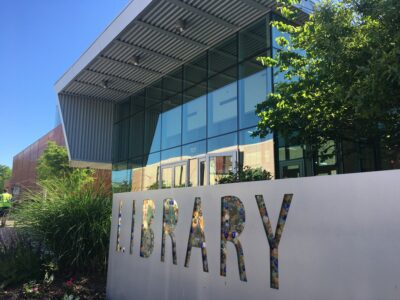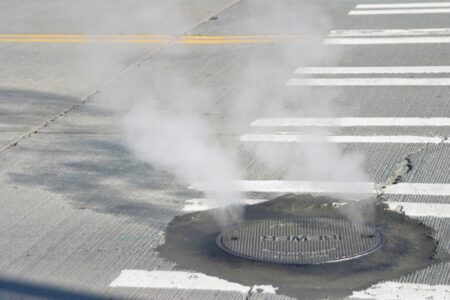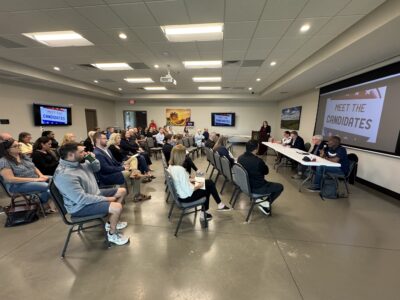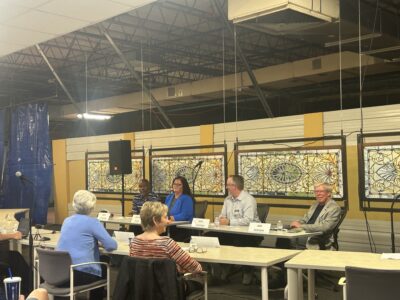At hearings next week, Lawrence leaders will discuss some changes to 2026 budget, including rec center fees, fire and medical staffing

photo by: Bremen Keasey
Lawrence's City Hall, located at 6 E. Sixth St., shown during June 2025.
As they hold hearings on the 2026 budget next week, Lawrence city commissioners will also be giving feedback on rec center fees and hearing about some updates to the proposal that would lessen the staffing reductions at Lawrence-Douglas County Fire Medical.
The commission’s meeting will focus on the final details of the 2026 city budget, which will come up for a final vote later in September. Commissioners on Tuesday will hold public hearings on the budget itself and their intent to set the mill levy, or property tax rate, above the revenue neutral rate.
The city has been working on the budget process since January in an effort to close a $6.6 million budget hole, and in July, the commission set its maximum mill levy at 33.986 mills. That would result in about a $25-a-year property tax increase for the owner of a $269,500 home in Lawrence — the median home value in 2023 — according to a presentation by city staff included in the commission’s meeting agenda.
However, the final property tax rate might not actually be set that high. When commissioners approved that maximum, they intentionally set it above what City Manager Craig Owens had initially proposed, which was 33.186 mills. The idea, Commissioner Brad Finkeldei said at the time, was to create some “wiggle room” in case the commission wanted to add more funding or reduce certain cuts to the police or fire departments.
Fire and medical spending will be one topic of discussion at Tuesday night’s hearings. A presentation included in the meeting agenda said city staff had updated the proposed budget to require fewer staffing reductions at Lawrence-Douglas County Fire Medical.
Initially, the 2026 budget proposal would have changed the minimum daily staffing of the fire and medical department from 39 people to 36. But now, the presentation said, the proposal is to reduce the minimum daily staffing at the department by only one person, from 39 to 38.
That’s not the only change from the initial budget proposal that will be discussed Tuesday. Another change involves the city’s Capital Improvement Plan, a blueprint for sustaining and improving community infrastructure. On that plan, the city had previously set aside $1.2 million in funding for a section of the Lawrence Loop trail from Michigan Street to Sandra Shaw Park, but the presentation says the project now is “no longer tenable” after problems with property acquisition. The presentation says that approximately $884,000 from that project can be reallocated now.
Commissioners on Tuesday will also give further direction on potential membership and entry fees for the city’s recreation centers.
When the proposed fees were first presented to the commission in July, they were listed at $25 a month or $250 a year for individual adult residents; $15 a month or $150 a year for residents ages 5 to 17 years old and ages 60 and older; and $40 a month or $400 a year for a family membership. But the commissioners discussed the idea of cutting all of those fees in half and and allowing free access to people under 17 and low-income residents.
The presentation now shows membership fees for Lawrence residents of $12 a month or $120 a year for adults, $8 a month or $80 a year for seniors, and $20 a month or $200 a year for families; fees for nonresidents would be higher. Douglas County residents under 17 — even if they do not live in Lawrence proper — would get in free, as would “financially qualified” low-income residents.
Tuesday’s discussions will happen as part of the public hearings that the city is required to hold, including one about exceeding the revenue neutral rate.
The revenue neutral rate, as defined by state law, is the mill levy required to raise the same amount of property tax revenue as the prior year, using the current year’s assessed valuation amount. According to a city memo, that rate would be 31.379 mills, about 2.6 mills lower than the maximum that the commission set in July.
After the public hearings, the commissioners will take a roll call vote on exceeding the revenue neutral rate. The final budget adoption vote will take place on Sept. 16.
A city memo lists the maximum amount the city could spend for 2026 as $661.9 million. However, this figure includes reserve funds that may not be used, so it doesn’t reflect the actual planned spending. The current proposed budget expects to collect around $54.6 million in property tax in 2026.
For 2025, the city had an approximately $647 million spending cap and collected $50.6 million in property taxes, according to state records.
• • •
In other business, commissioners will vote on a site plan for a development that would build 15 row houses on a vacant downtown Lawrence parking lot at 700 New Hampshire St.
The site plan for the project was administratively approved by city staff on July 22. But the commission’s vote is necessary because nearby property owners who have concerns about the project appealed that approval.
The plans for the row house project were first filed in January by local businessman Adam Williams, as the Journal-World reported. The three-story building would be constructed on the parking lot of the former Borders, which closed in 2011. It would include 15 2,353-square-foot units, which would each feature a one-car garage on the ground floor.
Because the proposed development falls within the “context area” around a historically protected building — the Octavious W. McAllaster house at 724 Rhode Island St., which was built in 1861 and survived Quantrill’s Raid — the Historic Resources Commission reviewed the plans first. That commission considered the project multiple times before recommending it on a 3-2 vote in May, as the Journal-World reported.
In their appeal, the property owners took issue with that review. They said the commission did not have “complete renderings” of the project and that there was “procedural confusion” during the commission’s review. They also argue that the row houses are “a stark contrast to the existing single-family homes” in the area and will negatively impact property values and parking.
The commission can now vote to approve the site plan with or without conditions; identify modifications that would allow for approval of the site plan; or reject the site plan.






